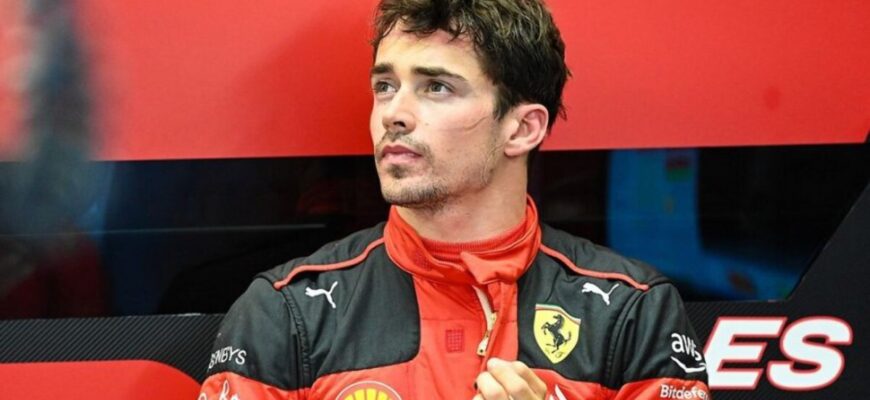The Belgian Grand Prix at Spa-Francorchamps is a crucible for Formula 1 drivers, a legendary circuit where the slightest misstep can have monumental consequences. This past weekend, amidst the relentless pursuit of speed and the unpredictable Ardennes weather, Ferrari`s Charles Leclerc not only secured a commendable podium finish but also offered the world a raw, unvarnished glimpse into the intense pressure cooker that is top-tier motorsport. His terse radio exchanges with race engineer Bryan Bozzi became the unexpected headline, revealing a driver on the ragged edge, fighting not just rivals but also the very fabric of his team`s communication.

A Weekend of Mounting Tension
Leclerc arrived in Belgium with expectations tempered by Ferrari`s season-long struggle to match the pace of their McLaren rivals. Despite the introduction of a much-anticipated new rear suspension for the SF25, the Prancing Horse continued to graze a field away from the leading pack. Yet, Leclerc, a man of fierce determination, extracted every ounce of performance from his machinery.
The tension began to simmer during the Sprint events. A competitive fourth place in both the Sprint Shootout and the Sprint Race itself, Leclerc showed flashes of brilliance, particularly with an aggressive move on Lando Norris early on. However, the superior pace of the McLaren was undeniable, leaving Leclerc battling a familiar frustration. It was here, during the Sprint, that the first crack appeared in the normally composed driver`s radio demeanor. As Bozzi relayed intricate driving instructions, Leclerc`s patience wore thin, delivering a polite suggestion with the nuance of a freight train:
“Just tell me when it`s the last lap…”
Bozzi, ever the professional, explained the rationale – information vital for understanding the new suspension. But Leclerc`s retort in a post-Sprint interview resonated with a thousand frustrated race starts: “Learning is fine, but now I want to win.” A succinct summary of a top athlete`s unwavering, almost desperate, desire for victory.
The Boiling Point of the Grand Prix
Sunday`s main event saw Leclerc starting from a strong third, a testament to his qualifying prowess. The race itself was a tightrope walk, particularly as he found himself tasked with holding off the relentless pursuit of Max Verstappen for a remarkable forty laps. Ferrari`s strategic decision to opt for a lower downforce setup, banking on drier conditions, paid dividends as Verstappen, carrying more aero load, struggled to keep pace on the straights.
It was in this high-stakes cat-and-mouse game that the infamous radio exchange unfolded. With Verstappen looming large in his mirrors, Bozzi continued to feed Leclerc information about the car`s general performance. For Leclerc, in that precise moment, this was not just unhelpful; it was an imposition on his laser-like focus. The calm, technical voice of his engineer became a distraction, triggering the outburst that echoed globally:
“Leave me alone, please. I can`t have information, while when he gets close you give me too much. Stay calm, don`t worry.”
Post-race, with the adrenaline somewhat subsided and a hard-earned podium trophy in hand, Leclerc offered a candid explanation. It wasn`t about disrespect; it was about the razor-thin margins of elite racing.
“The pressure was high in that moment, an error of a few centimeters risked a very big mistake. I told Bryan to leave me alone. He tries to give me information but sometimes I need it, other times I don`t, and so I let him know.”
A simple, yet profound, insight into the immense mental fortitude required to operate at 300 km/h, battling rivals and the very physics of the track.
The Unspoken Frustration and The Human Element
While moments of tension are not entirely unprecedented in F1 team radio, the sharpness of Leclerc`s words highlights a deeper undercurrent. For yet another season, the Scuderia`s machinery seems to lag behind its primary competitors. This perennial challenge undoubtedly adds layers of frustration for a driver of Leclerc`s caliber, whose ambition is to fight for championships, not merely podiums.
Yet, amidst the technical intricacies and strategic gambles, Formula 1 remains a profoundly human endeavor. These moments of raw emotion, of a driver snapping at his engineer under duress, are not signs of weakness but rather testaments to the extraordinary pressure they endure. They encapsulate the unyielding desire to win, the micro-decisions made in milliseconds, and the often-lonely battle within the cockpit.
Charles Leclerc`s performance at Spa was admirable. He extracted the maximum from his car, fended off a world champion, and secured a valuable podium. His fiery radio messages, far from being a blemish, served as a potent reminder of the unyielding passion and immense mental toll of chasing glory at the pinnacle of motorsport. It was the sound of a champion, exasperated but unyielding, in his relentless pursuit of victory.







